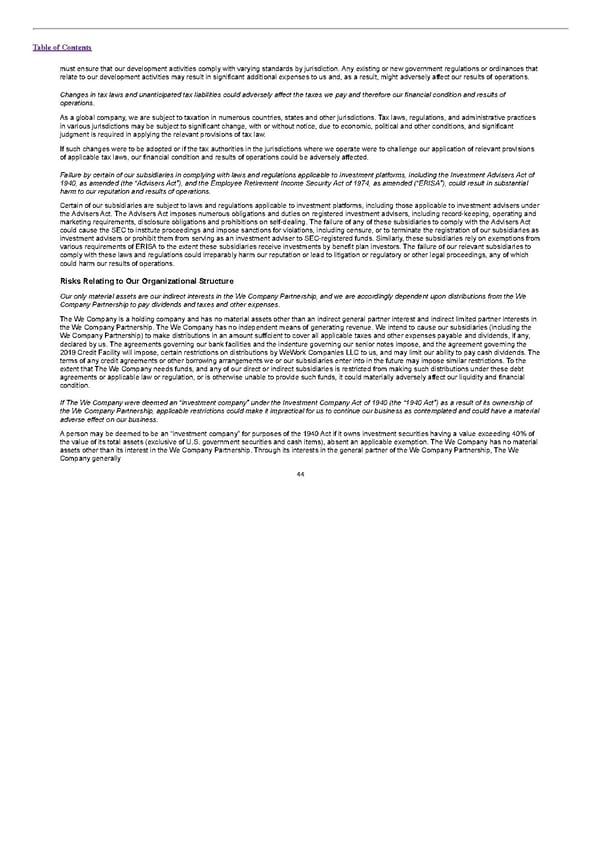Table of Contents must ensure that our development activities comply with varying standards by jurisdiction. Any existing or new government regulations or ordinances that relate to our development activities may result in significant additional expenses to us and, as a result, might adversely affect our results of operations. Changes in tax laws and unanticipated tax liabilities could adversely affect the taxes we pay and therefore our financial condition and results of operations. As a global company, we are subject to taxation in numerous countries, states and other jurisdictions. Tax laws, regulations, and administrative practices in various jurisdictions may be subject to significant change, with or without notice, due to economic, political and other conditions, and significant judgment is required in applying the relevant provisions of tax law. If such changes were to be adopted or if the tax authorities in the jurisdictions where we operate were to challenge our application of relevant provisions of applicable tax laws, our financial condition and results of operations could be adversely affected. Failure by certain of our subsidiaries in complying with laws and regulations applicable to investment platforms, including the Investment Advisers Act of 1940, as amended (the “Advisers Act”), and the Employee Retirement Income Security Act of 1974, as amended (“ERISA”), could result in substantial harm to our reputation and results of operations. Certain of our subsidiaries are subject to laws and regulations applicable to investment platforms, including those applicable to investment advisers under the Advisers Act. The Advisers Act imposes numerous obligations and duties on registered investment advisers, including record-keeping, operating and marketing requirements, disclosure obligations and prohibitions on self-dealing. The failure of any of these subsidiaries to comply with the Advisers Act could cause the SEC to institute proceedings and impose sanctions for violations, including censure, or to terminate the registration of our subsidiaries as investment advisers or prohibit them from serving as an investment adviser to SEC-registered funds. Similarly, these subsidiaries rely on exemptions from various requirements of ERISA to the extent these subsidiaries receive investments by benefit plan investors. The failure of our relevant subsidiaries to comply with these laws and regulations could irreparably harm our reputation or lead to litigation or regulatory or other legal proceedings, any of which could harm our results of operations. Risks Relating to Our Organizational Structure Our only material assets are our indirect interests in the We Company Partnership, and we are accordingly dependent upon distributions from the We Company Partnership to pay dividends and taxes and other expenses. The We Company is a holding company and has no material assets other than an indirect general partner interest and indirect limited partner interests in the We Company Partnership. The We Company has no independent means of generating revenue. We intend to cause our subsidiaries (including the We Company Partnership) to make distributions in an amount sufficient to cover all applicable taxes and other expenses payable and dividends, if any, declared by us. The agreements governing our bank facilities and the indenture governing our senior notes impose, and the agreement governing the 2019 Credit Facility will impose, certain restrictions on distributions by WeWork Companies LLC to us, and may limit our ability to pay cash dividends. The terms of any credit agreements or other borrowing arrangements we or our subsidiaries enter into in the future may impose similar restrictions. To the extent that The We Company needs funds, and any of our direct or indirect subsidiaries is restricted from making such distributions under these debt agreements or applicable law or regulation, or is otherwise unable to provide such funds, it could materially adversely affect our liquidity and financial condition. If The We Company were deemed an “investment company” under the Investment Company Act of 1940 (the “1940 Act”) as a result of its ownership of the We Company Partnership, applicable restrictions could make it impractical for us to continue our business as contemplated and could have a material adverse effect on our business. A person may be deemed to be an “investment company” for purposes of the 1940 Act if it owns investment securities having a value exceeding 40% of the value of its total assets (exclusive of U.S. government securities and cash items), absent an applicable exemption. The We Company has no material assets other than its interest in the We Company Partnership. Through its interests in the general partner of the We Company Partnership, The We Company generally 44
 S1 - WeWork Prospectus Page 48 Page 50
S1 - WeWork Prospectus Page 48 Page 50